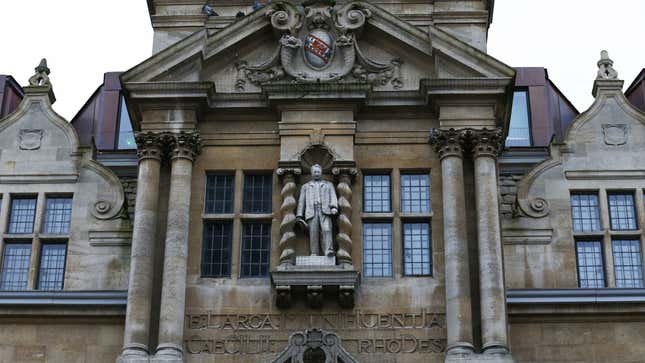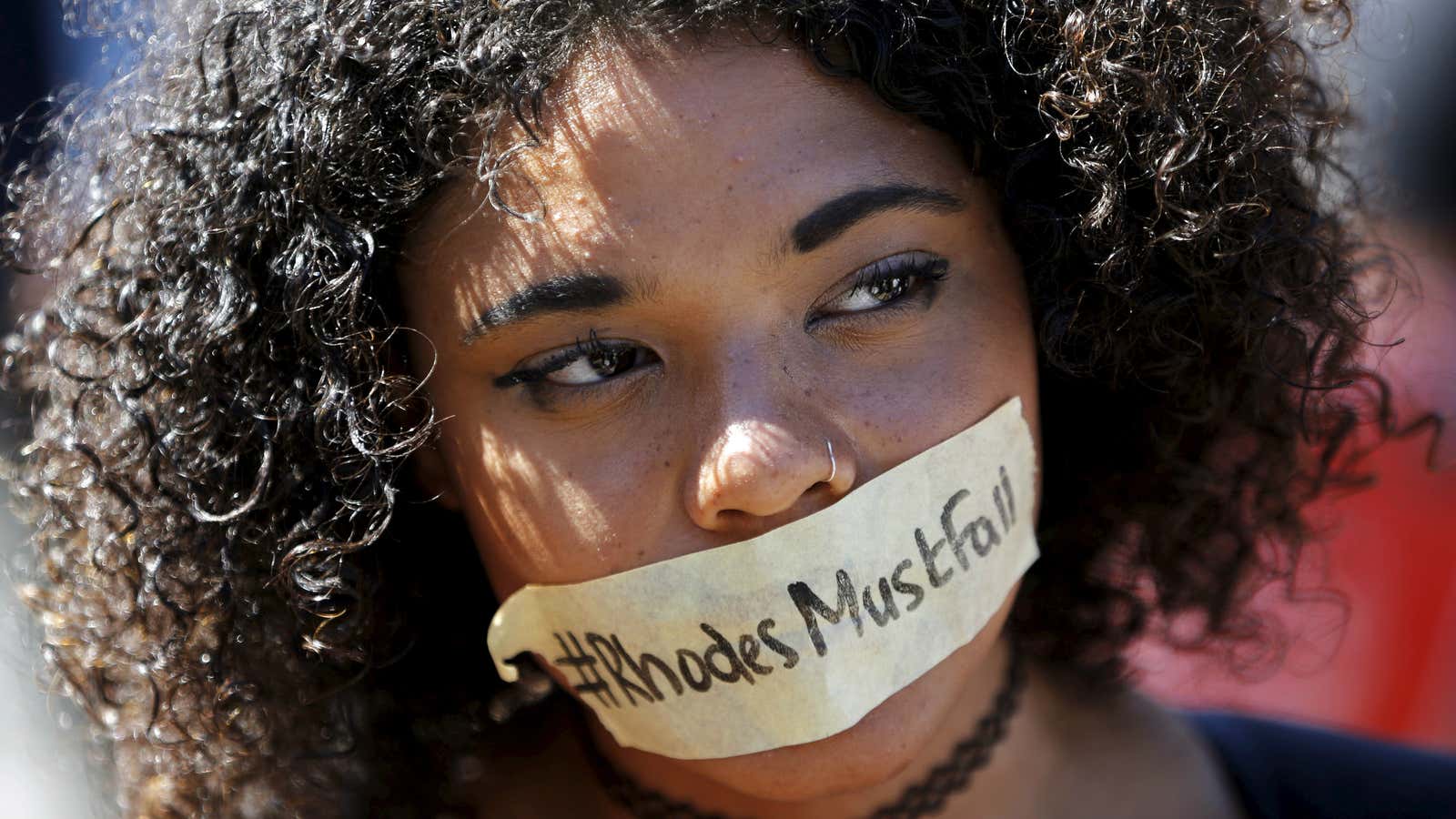Cecil Rhodes has been dead for over a century, but the man remains just as divisive in death as in life. He is at the heart of a fierce debate about freedom of speech and institutional racism at Oxford University—just one of a several such disputes in the UK, the US, and elsewhere.
To some, Rhodes is a businessman who founded the modern diamond industry. To others he is best described as “the father of apartheid.“ Rhodes firmly believed that the English were a master race and was keen to bring areas “inhabited by the most despicable specimen of human being” under British rule. In Africa he not only played an instrumental role in pushing through South Africa’s policy of racial segregation and discrimination, but named and acquired both Southern Rhodesia (now Zimbabwe) and Northern Rhodesia (now Zambia) as British protectorates.
That’s why Chumani Maxwele, a student at the University of Cape Town, threw human excrement over the Rhodes statue on the campus last March. The protest would spark a movement with a provocative rallying cry: Rhodes Must Fall.
The statue would go on to be removed within a month at the University of Cape Town. Inspired, hundreds of students at the University of Oxford, home of the prestigious Rhodes Scholarships, have mobilized with a similar aim in mind. But the responses have been mixed.
Confronting a dubious past
When Rhodes died in 1902, he left part of his fortune to Oxford, his alma mater, to launch an international postgraduate scholarship program for talented students. Rhodes Scholars have gone on to be heads of state, Nobel prize winners, and Pulitzer prize winners.
Besides the scholarship itself, Oxford has a statue of Rhodes at Oriel College, where he studied; a building named after him (Rhodes House); a commemorative plaque on a house where he lived as a student; and, in a new addition to the controversy, the “Rhodes Computer Room” at University College. It is this legacy and iconography that students are keen to challenge.

Tadiwa Madenga, a member of Rhodes Must Fall, has described the campaign as “one of the few platforms where the history of Rhodes’ crimes has been spoken about with honesty.” Rhodes Must Fall launched a petition three months ago, so far signed by over 2,700 people, that states: “As long as the statue remains, Oriel College and Oxford University continue to tacitly identify with Rhodes’s values, and to maintain a toxic culture of domination and oppression.”
Oriel College, in a statement responding to the petition, agreed to remove the commemorative plaque, saying that its “wording is a political tribute” and is “inconsistent with our principles.” (The plaque says it was put up “in recognition of the great services rendered by Cecil Rhodes to his country.”) Oriel will also launch a “structured six-month listening exercise” from February this year to discuss what to do about the statue. In the meantime, the college has placed a note below the statue, which reads: “In acknowledging the historical fact of Rhodes’ bequest, the college does not in any way condone or glorify his views or actions.”
Other members of faculty have been less forthcoming.
Chris Patten, the university’s chancellor, has called on students to be more open-minded about Rhodes and his legacy. He points to Nelson Mandela, who joined forces with the Rhodes Trust to launch scholarships to educate the future generation of African leaders. Speaking to Radio 4 Today’s Program earlier this month, Lord Patten said that those unable to engage with Oxford’s history and embrace the principles of freedom of speech “should think about being educated elsewhere.”
Rhodes Must Fall campaigners in South Africa argue that Mandela’s attempt at reconciliation may not represent ”the views of all black people alive today.” Even Nelson Mandela’s oldest grandson, Mandla Mandela, has backed the campaign.
Is this an attack on free speech?
In the US there has been similar pressure to remove symbols with a racist history from university campuses. Students at Yale are currently petitioning the university to change the name of Calhoun College—named after John C. Calhoun, a South Carolina senator who fiercely defended slavery, calling it a ”positive good.” Students have also called on the university to make Yale more welcoming to non-white students. Princeton has just started campus discussions about the legacy of Woodrow Wilson, the pro-segregation president whose name adorns several university buildings.
For critics like Lord Patten, however, removing racist iconography is not only an attempt to rewrite history, but part of a broader movement to deny students the right to “engage in free inquiry and debate.” Last year, thousands of people signed a petition to stop author Germaine Greer, who has publicly insisted that transgender women aren’t real women, from speaking at Cardiff University (she eventually did). Julie Bindel, another trans-exclusionary feminist, was barred from a debate at Manchester University, while Maryam Namazie’s invitation to speak at the University of Warwick was blocked. In fact, a recent analysis (paywall) suggests that more than half of all student unions banned pressure groups, certain types of behaviors, and songs last year.
In the US, an American professor admitted to being terrified of upsetting his liberal students (and he suggests he’s not alone), while a Yale teacher quit after the backlash she received for suggesting students had a right to wear Halloween costumes that some people might find racially insensitive.
The Rhodes Must Fall campaigners don’t see themselves as suppressing debate. “We’re not trying to erase history or freedom of speech,” Roseanne Chantiluke, an Oxford student member of Rhodes Must Fall, tells Quartz. Instead, she says the campaign has willingly engaged with supporters and critics, both online or in person, to “open up a dialogue of a violent history that has been whitewashed.”
And while this type of discussion is important, Chantiluke says it’s not “the be all and end all” for the campaign. Rhodes Must Fall wants to take concrete steps to “decolonize” education. The campaigners are calling on the university to reform the curriculum, which they believe to be too Eurocentric, and get more students and staff from ethnic minorities to Oxford.
A university spokesperson tells Quartz that Oxford has already, and will continue, to engage with Rhodes Must Fall as they work on a range of actions to improve “the experience of minority ethnic students.”
For now, campaigners are doubling their effort to bring down the statue of Rhodes. If he falls in Oxford, other universities in the UK and the US may soon have to look to their own complicated past.
